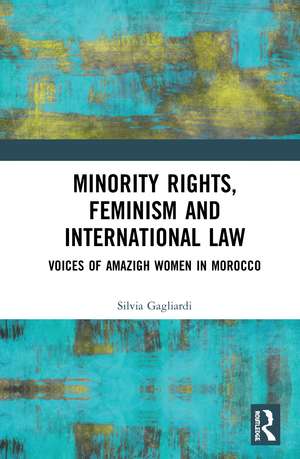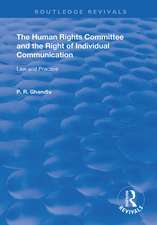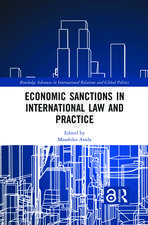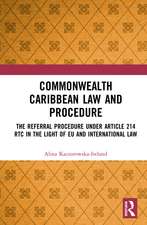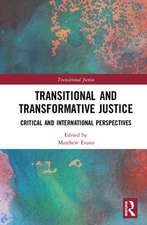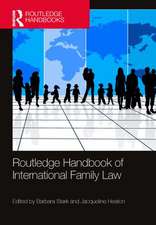Minority Rights, Feminism and International Law: Voices of Amazigh Women in Morocco
Autor Silvia Gagliardien Limba Engleză Hardback – 8 iul 2020
Based on extensive and diverse ethnographic research on Amazigh women in Morocco, the book unpacks and challenges generally accepted notions of rights and equality. Significantly, and controversially, the book challenges the supposedly ‘emancipatory’ power vested in the human rights project; arguing that rights-based discourses are sites of contestation for different groups that use them to assert their agency in society. More specifically, it shows how the very conditions that make minority and indigenous women instrumental to the preservation of their culture may condemn them to a position of subalternity. In response, and engaging the notion and meaning of Islamic feminism, the book proposes that feminism should be interpreted and contextualised locally in order to be effective and inclusive, and so in order for the human rights project to fully realise its potential to empower the marginalised and make space for their voices to be heard.
Providing a detailed, empirically based, analysis of rights in action, this book will be of relevance to scholars, students and practitioners in human rights policy and practice, in international law, minorities’ and indigenous peoples’ rights, gender studies, and Middle Eastern and North African Studies.
| Toate formatele și edițiile | Preț | Express |
|---|---|---|
| Paperback (1) | 272.50 lei 6-8 săpt. | |
| Taylor & Francis – 29 apr 2022 | 272.50 lei 6-8 săpt. | |
| Hardback (1) | 1000.61 lei 6-8 săpt. | |
| Taylor & Francis – 8 iul 2020 | 1000.61 lei 6-8 săpt. |
Preț: 1000.61 lei
Preț vechi: 1220.26 lei
-18% Nou
Puncte Express: 1501
Preț estimativ în valută:
191.46€ • 199.90$ • 158.46£
191.46€ • 199.90$ • 158.46£
Carte tipărită la comandă
Livrare economică 05-19 aprilie
Preluare comenzi: 021 569.72.76
Specificații
ISBN-13: 9780367902766
ISBN-10: 0367902761
Pagini: 202
Dimensiuni: 156 x 234 x 13 mm
Greutate: 0.46 kg
Ediția:1
Editura: Taylor & Francis
Colecția Routledge
Locul publicării:Oxford, United Kingdom
ISBN-10: 0367902761
Pagini: 202
Dimensiuni: 156 x 234 x 13 mm
Greutate: 0.46 kg
Ediția:1
Editura: Taylor & Francis
Colecția Routledge
Locul publicării:Oxford, United Kingdom
Public țintă
Postgraduate and UndergraduateCuprins
Table of Contents
Introduction 1.Introduction
2. Methodology
3. Structure of the book
Chapter I: Theoretical framework
1. Human rights: Universality vs relativity
1.1. Feminism and international law
1.2. Islam and women’s human rights
1.3. Feminism, gender and women’s rights
1.4. Feminism and group rights
1.5. Concepts, theories and the law
1.5.1. Minority groups and indigenous peoples in international law
1.5.2. Minority rights theories and critiques
1.6. The Moroccan case
Chapter II: The politics of rights: Morocco’s human rights structure
2.1. Establishment of the State
2.1.1. Pre-colonial Morocco (1830-1912)
2.1.2. Colonial Morocco (1912-1956)
2.1.3. The quest for Morocco’s independence (1930-1961)
2.1.4. King Hassan II’s reign (1961-1999)
2.1.5. King Mohammed VI’s reign (1999-present)
Chapter III: Shaping narratives in Moroccan society
3. Performing roles and rights
3.1. Co-optation
3.1.1. National institutions
3.1.2. The Arab Spring
3.2. Identity construction
3.2.1. The history of the Amazigh community and movement(s)
3.2.2. Definition of a collective identity
3.2.3. Group consciousness
3.2.4. When Amazigh women speak
3.3. Gender and women’s issues
3.4. Ideological divides
3.4.1. Women’s groups
3.4.2. Civil society and political parties
3.5. Conclusions
Chapter IV: Mapping over the Amazigh body
4. Intersectionality
4.1. Being an Amazigh
4.2. Speaking the language
4.3. Living in a rural area
4.4. Being religious
4.5. Living in a patriarchal culture
4.6. Conclusions
Conclusions
Bibliography
Appendices
Appendix I: Confidentiality Form for Translators
Appendix II: Participant Information Sheet
Appendix III: Participant Consent Form
Introduction 1.Introduction
2. Methodology
3. Structure of the book
Chapter I: Theoretical framework
1. Human rights: Universality vs relativity
1.1. Feminism and international law
1.2. Islam and women’s human rights
1.3. Feminism, gender and women’s rights
1.4. Feminism and group rights
1.5. Concepts, theories and the law
1.5.1. Minority groups and indigenous peoples in international law
1.5.2. Minority rights theories and critiques
1.6. The Moroccan case
Chapter II: The politics of rights: Morocco’s human rights structure
2.1. Establishment of the State
2.1.1. Pre-colonial Morocco (1830-1912)
2.1.2. Colonial Morocco (1912-1956)
2.1.3. The quest for Morocco’s independence (1930-1961)
2.1.4. King Hassan II’s reign (1961-1999)
2.1.5. King Mohammed VI’s reign (1999-present)
Chapter III: Shaping narratives in Moroccan society
3. Performing roles and rights
3.1. Co-optation
3.1.1. National institutions
3.1.2. The Arab Spring
3.2. Identity construction
3.2.1. The history of the Amazigh community and movement(s)
3.2.2. Definition of a collective identity
3.2.3. Group consciousness
3.2.4. When Amazigh women speak
3.3. Gender and women’s issues
3.4. Ideological divides
3.4.1. Women’s groups
3.4.2. Civil society and political parties
3.5. Conclusions
Chapter IV: Mapping over the Amazigh body
4. Intersectionality
4.1. Being an Amazigh
4.2. Speaking the language
4.3. Living in a rural area
4.4. Being religious
4.5. Living in a patriarchal culture
4.6. Conclusions
Conclusions
Bibliography
Appendices
Appendix I: Confidentiality Form for Translators
Appendix II: Participant Information Sheet
Appendix III: Participant Consent Form
Recenzii
"Providing a detailed and empirical analysis of rights in action, this book will be of relevance to scholars, students, and practitioners in human rights policy and practice, in international law, minorities’ and indigenous peoples’ rights, gender and religion, and Middle Eastern and North African Studies." - Mark Fathi Massoud, University of California
Descriere
Investigating minority and indigenous women's rights in Muslim-majority states, this book critically examines the human rights regime within international law.
